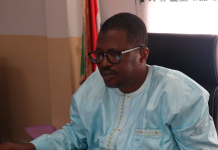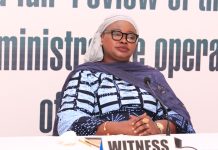By Fatoumatta K. Jallow
World Health Organization (WHO) held a donor briefing on the strategic partnership portal on Thursday 1st September 2016, at  the Paradise Suites hotel in Kololi.
the Paradise Suites hotel in Kololi.
Dr. Charles Sagoe-Moses, the WHO Country Representative, in his opening statement, said the recent Ebola outbreak in West Africa did not only cause human catastrophe or loss of lives but also served as an eye opener for all of them. “The outbreak showed vividly how fragile and weak health system in the sub-region are and has awakened us to see how inadequate, our approach and response towards emergencies is,” said the WHO Rep.
Dr. Sagoe-Moses said in July 2015 the WHO in collaboration with member states and partners convened a high-level meeting in Cape Town, South Africa, with the theme: ‘Building Health Security beyond Ebola’. He said one of the outcomes of the meeting was that member states partners called WHO to set up a Strategic Partnership Portal (SPP).
“The SPP is a platform that allows countries, donors, partners, international agencies and health security stakeholders to know the activities and initiatives being carried out in various countries in building core capacities of the International Health Regulations (IHR),” he said.
The WHO Rep noted that this SPP will enable donors and partners to know who is doing what, where and when, adding that the SPP tool enables multiple commitments in addressing global health security and that the tool promotes inter-agency coordination, communication and collaboration (3C’s).
“Therefore overlapping of investment by donors and partners is prevented because the SPP provides clear visibility on country needs as well as promotes interagency coordination and duplication of efforts is prevented and the needs and gaps in countries are easily identified. The SPP promotes transparency and the tool can be used by anybody,” said Dr. Sagoe-Moses.
Madam Saffie Lowe Ceesay, the Permanent Secretary of the Ministry of Health and Social Welfare, deputising the health minister, said the global partnerships are essential to the successful implementation of the IHR.
She said partnership is required between all countries to share technical skills and resources, to support capacity strengthening at all levels, as well as support each other in times of crisis and promote transparency.
The health permanent secretary said partnership between different sectors example health, agriculture, transports, trade, education and defense is also essential to build coherent alert and response systems which cover all public health threats and at the time of events are able to rapidly mobilize the required resources in a flexible and responsive way.
‘In March 2014, West Africa has been confronted with an unprecedented Ebola virus disease outbreak. Despite all efforts made by governments of affected countries and the international community, the epidemic continues to claim many victims,” she said.
She added that to prevent further spread of epidemic, countries are supported to develop and finalize their preparedness plan for appropriate response in case of outbreak of Ebola virus disease.
Madam Lowe Ceesay said the release of new guidelines and a checklist by WHO for countries in the state of preparedness, led The Gambia to develop a comprehensive and well cost one year nation Ebola virus disease strategic plan reflecting the new imperative of Ebola transmission in sub-region.
“We believe this will be the beginning for the strengthening of the alignment between health security stakeholders, enhancing transparency among partners, increasing accountability to maximize results, and to strengthening our health systems as a whole,” she concluded.




















